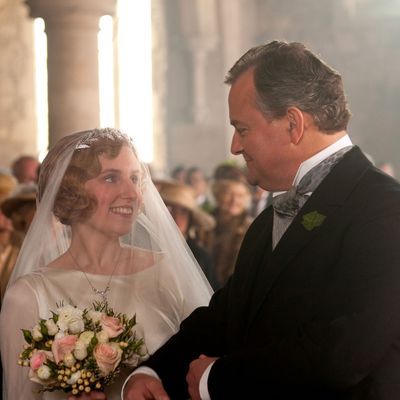
It wasnÔÇÖt easy for Downton Abbey addicts to avoid spoilers this season (and for addicts tardy to SundayÔÇÖs season finale, there are spoilers in this post). As the costume dramaÔÇÖs popularity exploded, PBSÔÇÖs delayed U.S. broadcast of the show ÔÇö airing it four months after it first aired in the U.K ÔÇö made it difficult to dodge key plot points in advance, whether fans couldnÔÇÖt resist prowling British recaps or their Google alerts accidentally revealed that Dan Stevens was leaving the show, which made it pretty obvious that Matthew would die.
But this would be so easy to fix! clamor fans. Just air the show in the U.S. at the same time it airs in the U.K., and then we can all be shocked together when Edith gets married for real next time. Vulture got PBSÔÇÖs chief programming executive-general manager Beth Hoppe on the phone to inquire about the possibility. She gave us the good news first: Executives are ÔÇ£absolutely consideringÔÇØ a simultaneous broadcast. But as our conversation went on, the more it became clear that it is unlikely, because there just isnÔÇÖt any upside for PBS. HereÔÇÖs how Hoppe explained things:
Spoilerphobes may have been mad, but they still watched.
Back in December, the Internet flooded with tears after online headlines spoiled MatthewÔÇÖs demise. But itÔÇÖs impossible to quantify the actual percentage of┬áDownton viewers who had the story ruined for them, and Hoppe says the fan feedback hasnÔÇÖt been that bad. WhatÔÇÖs more, viewers donÔÇÖt appear to have abandoned the show as a result. ÔÇ£There is a little bit of negative buzz around the spoilers, but itÔÇÖs pretty minimal from what weÔÇÖre hearing,ÔÇØ Hoppe says, pointing to the ratings, which are ginormous. PBS says the third season of┬áDownton┬áis averaging more than 11 million viewers per episode (when you factor in the premiere plus seven days of DVR viewing). ThatÔÇÖs 420 percent above the public broadcasterÔÇÖs average prime-time rating and double the average viewership of the showÔÇÖs second season. By far, it is the most-watched program in PBS history. ÔÇ£That kind of success is hard to argue with,ÔÇØ she says. ItÔÇÖs also worth noting that SybilÔÇÖs episode-five death didnÔÇÖt become headline news in the U.S. the way MatthewÔÇÖs did, proving that some secrets make it to the U.S. intact.
Marketing Downton in the fall would be more difficult.
Premiering in the fall isnÔÇÖt an obstacle in and of itself ÔÇö ÔÇ£WeÔÇÖre not scheduled so far out that we donÔÇÖt have flexibility,ÔÇØ Hoppe says ÔÇö but having to break through the marketing clutter does give PBS executives pause. In September, new shows from CBS, ABC, Fox, and NBC will be fighting for attention, marketed by networks that can handily outspend PBS. The TV landscape in January is always a little quieter, with fewer mid-season replacements competing for noise. A concurrent fall broadcast would also mean needing the┬áDownton┬áactors to help promote the show in the U.S. when theyÔÇÖre also doing so in the U.K. (And as the show has become more popular, the cast has been busier with other projects.) ÔÇ£In December, weÔÇÖve been able to have the cast available for promotion. They were the toast of the town in New York and L.A., and that kind of thing might not be possible if we decided to move it earlier,ÔÇØ says Hoppe.
At the same time, one could argue that┬áThe Walking Dead has demonstrated that some shows can go up against the broadcasters in fall and win. ÔÇ£Sure,ÔÇØ Hope agrees, ÔÇ£you could spin that argument and say, ÔÇÿWell, itÔÇÖs so hot, itÔÇÖll be hot wherever you put it.ÔÇÖÔÇØ The question for PBS becomes: Why mess with whatÔÇÖs working in January?┬áDownton┬áhas been an established hit there for three seasons and is now┬áa proven alternative to the Super Bowl.
Editing episodes for PBS more quickly would also be more costly. 
The version of┬áDownton┬áthat airs in the U.K. is slightly different than the one that airs in the U.S. ITV is a commercial network that ran season three over eight installments, while commercial-free PBS ran the same season in just six. That requires some ÔÇ£stitching together and filling outÔÇØ for the American version, Hoppe says. And because the editing is done entirely by the creative team in the U.K., ÔÇ£what it would mean in order for us to go simultaneously with them is that weÔÇÖd have to have two editing rooms going at the same time during postproduction, one for our version and one for theirs,ÔÇØ Hoppe says. ÔÇ£ItÔÇÖs not one of the main factors in the decision, but itÔÇÖs not an insignificant financial implication.ÔÇØ
While the showÔÇÖs producers are for simultaneous airing, PBS has the final say.┬á
Downton Abbey┬áexecutive producer Gareth Neame┬átold Vulture┬áin December that he, too, wished U.S. audiences could share in the first viewing.┬áÔÇ£In this day and age, itÔÇÖs clearly ridiculous that people watch the show in England four months early and 1.5 million people in America go and watch it illegally,ÔÇØ he said. ÔÇ£If I were PBS and I had the biggest drama IÔÇÖd ever had in my entire 40-year history, I would be sorting my schedules out to make sure I was airing it more quickly.ÔÇØ Hoppe says Neame is and has been part of the scheduling discussion: ÔÇ£Of course we consult with our partners. We want everyone to be happy.ÔÇØ But, ÔÇ£ultimately, PBS and┬áMasterpiece┬ámake the final decision, and we are absolutely in conversation with Gareth.ÔÇØ

